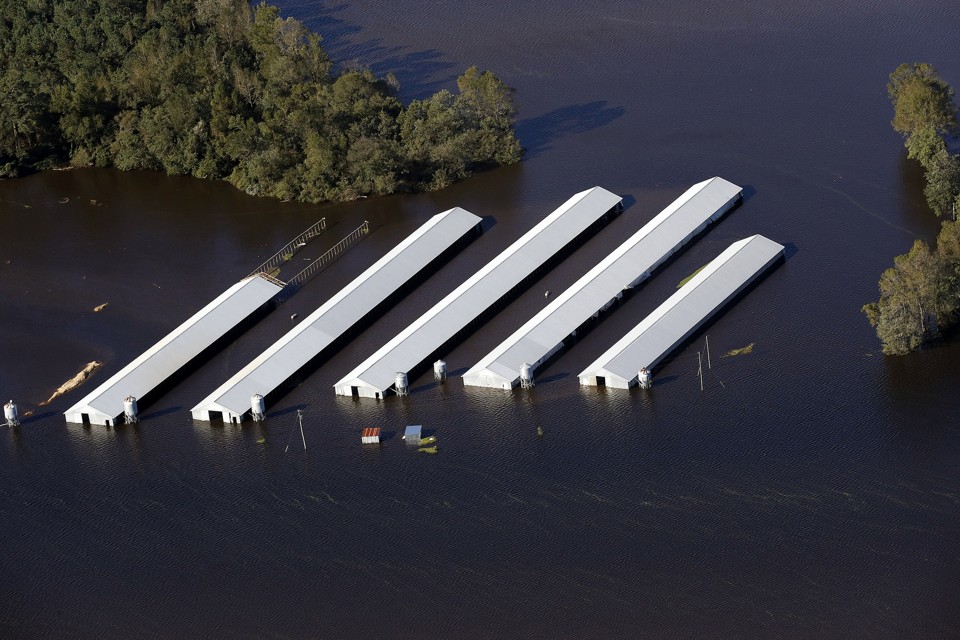North Carolina's Floods Threaten to Unleash Lagoons of Pig Poop
Floodwaters from Hurricane Matthew are still rising, and the worst is yet to come.
 An animal farm in North Carolina flooded after Hurricane Matthew. Rick Dove, Waterkeeper Alliance
An animal farm in North Carolina flooded after Hurricane Matthew. Rick Dove, Waterkeeper Alliance Where there is pig, there is poop. In North Carolina, the country’s second biggest pork-producing state, feces from industrial pig farms lie in open-pit lagoons. On a normal day, the lagoons stink and emit toxic fumes. On days like today, as floodwaters from Hurricane Matthew continue to rise, the lagoons pose an even bigger danger: If the flood breaches the lagoons, all the feces would come gushing out.
It’s happened before. In 1999, Hurricane Floyd dumped 19 inches of rain on North Carolina. The lagoons overflowed. “Feces and urine soaked the terrain and flowed into rivers from the overburdened waste pits,” wrote the New York Times back in 1999. “The storm killed more than two million turkeys, chickens and livestock in the region, and waste from the farms is expected to keep leaching into the water supply until next spring.” The same thing happened in 1998 (Hurricane Bonnie) and 1996 (Hurricane Fran).

Pigs struggling to survive in Trenton, North
Carolina after Hurricane Floyd. (Reuters)
Matthew could do just as much damage; the worst is still to come. Flooding after a hurricane can be a slow-moving, if predictable, affair. Rainwater collects into streams that feed into tributaries that feed into rivers, and several days later, all the rainfall over hundreds of square miles is flowing down one swollen river. Post-Matthew, rivers in North Carolina are not expected to crest until as late as Friday or Saturday.
Thousands of chicken and pigs have already drowned in their barns in North Carolina. So far, Travis Graves of Sound Rivers, an environmental nonprofit in North Carolina, says he has seen a couple lagoons breached on aerial flights near the Neuse River. After Hurricane Floyd, the state bought out some farms in flood-prone places—to close their lagoons and prevent fecal floods in the event of future hurricanes—but plenty of lagoons remain in the area. “We’ve literally got hundreds of lagoons on the eastern coastal plan,” says Graves. The southeastern corner of North Carolina, where pig farms are concentrated, is unfortunately also the area hit hardest in the latest hurricane.
Big industrial pig farms use the lagoon system to save money. “It’s the cheapest method of so-called ‘treating’ the waste,” says Michael Mallin, an ecologist at the University of North Carolina at Wilmington. After solids settle out of the manure slurry and bacteria decompose the organic matter, farmers spray the remaining liquid onto fields as fertilizer. The stuff is rich in nitrogen and phosphorous—which works for fertilizer—but that also makes it disastrous when it gets into rivers after a flood.
That’s because the extra nutrients cause blooms of bacteria such as algae. “The natural bacteria multiply like crazy in the water, and they’re sucking out dissolved oxygen in the water,” says Mallin. Without oxygen, fish die. After Hurricane Fran, Mallin recalls, “You could go out to one of the boat landings and stand there. Literally it was just covered with dead and dying fish on the surface of the river.”
The lagoons, full of fecal pig bacteria, aren’t so great for humans either. One study found increased hospital visits due to gastrointestinal illnesses in the immediate aftermath of Hurricane Floyd.
In 2007, North Carolina passed a law banning waste lagoons on new pig farms. Few new farms have opened in the state since then. “The reality is cost,” says Mike Williams, a biologist at North Carolina State University, who has considered alternative methods for dealing pig waste. A more environmentally friendly alternative could be anaerobic digesters, in which bacteria turn the poop into natural gas. But it’s still too expensive for most farmers compared to keeping a lagoon.
The lagoon system is, very slowly, on its way out. But for now, as Hurricane Matthew's floodwaters rise, North Carolina bears the health and environmental cost of cheap pork.






